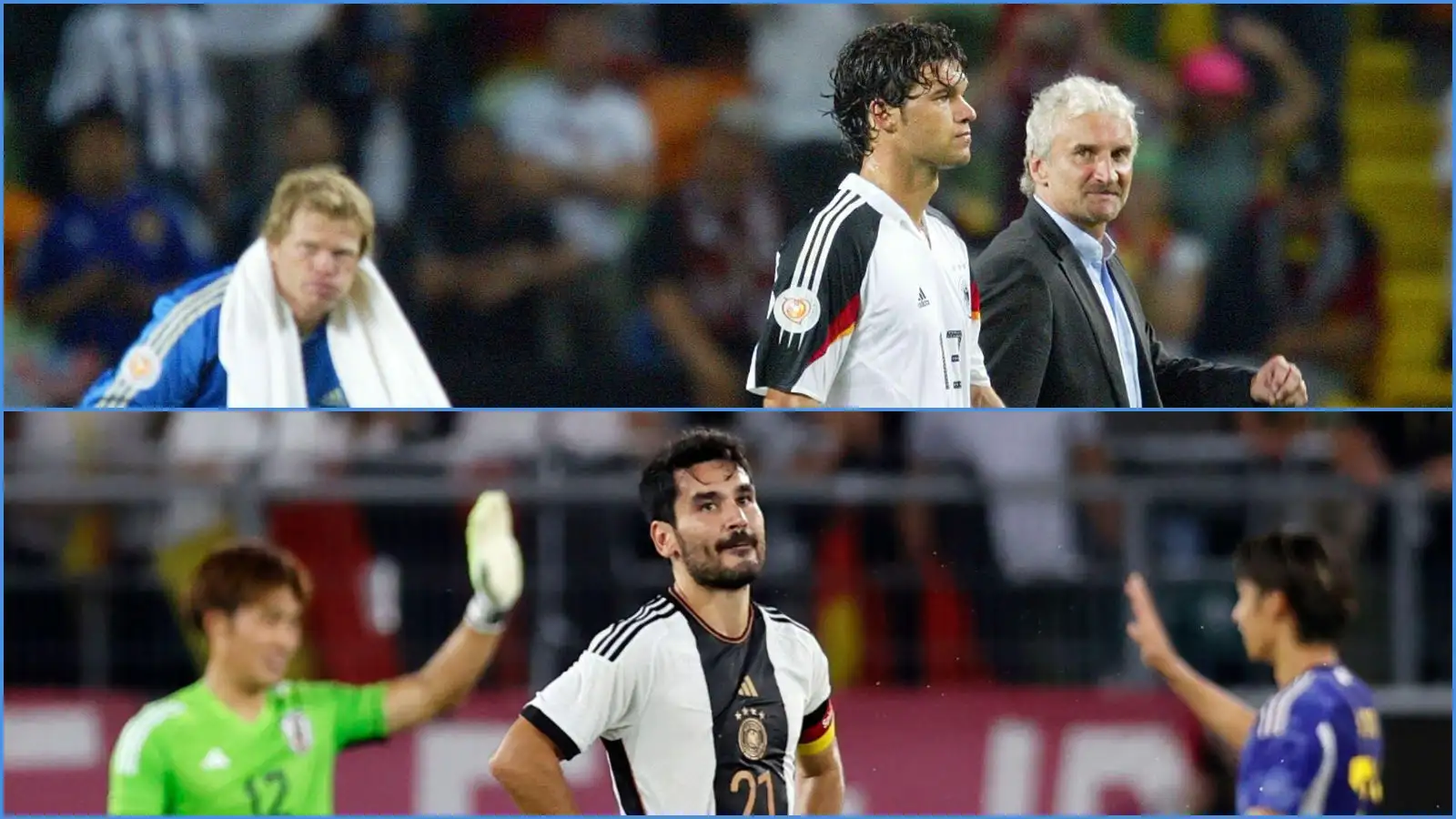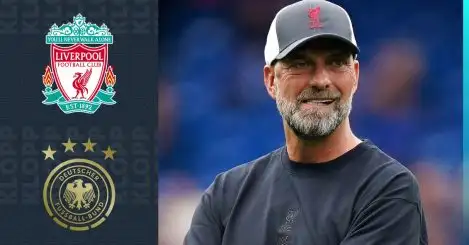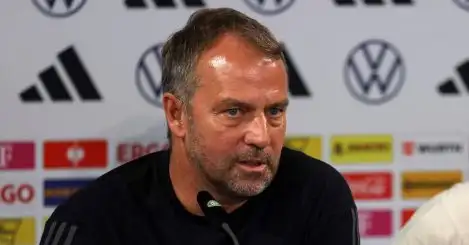Germany can’t flick a switch or switch a Flick to solve what has become rotten at their core again

For the second time this century, Germany need to rip everything up and start again to avoid embarrassment as the host nation of a major tournament.
A tumultuous and dramatic international break for Germany ended on a positive note with a 2-1 home win against an undercooked France, but a loss of identity and sense of crisis is the overriding theme of the national team right now.
A truly humbling 4-1 loss to Japan in Wolfsburg on Saturday night was the end of Hansi Flick’s wretched two-year reign in charge, which saw him win just 12 of his 25 games and lead Germany to a second consecutive World Cup group-stage exit – a tournament in which they also lost to the Japanese not so coincidentally. It was a third straight loss for Germany and a fourth in fifth games, none of which came against truly elite sides.
Flick had been parachuted in following a disappointing Euros, in which Germany suffered defeat at the hands of England for one of the very few times in recent competitive action, and perhaps for the first time in modern history, fell behind their great rivals in European football’s pecking order.

Raheem Sterling celebrates scoring against Germany
The 58-year-old was expected to reverse the trend upon replacing Joachim Low, the man he assisted from 2006 to 2014, particularly after winning the Treble with Bayern Munich in the 2019/20 season with several of the team’s star players.
That loss to England came just three years after the decline began as their defence of a fourth World Cup crown ended in an even more shocking exit at the hands of South Korea.
At that point, it perhaps felt like a blip but it is unavoidable now: there is something rotten in the state of German football.
With a home Euros fast on the horizon, there are serious parallels but differences with the current situation to that facing Die Nationalmannschaft 17 years ago as they geared up to host the World Cup.
Similarly, Germany found themselves in a stasis as a football nation, having suffered back to back humiliations at Euros 2000 and 2004.
The World Cup was a different story but a final appearance in 2002 was more a result of the brilliance of Oliver Khan, Michael Ballack and Miroslav Klose, as well as a favourable path to the final, than a resurgence. 1998 saw the initial alarm signals go off as Croatia (on their first outing as an independent nation) dispatched the traditional European powerhouse 3-0 in the quarter-finals.
Back then, it was the smaller eastern European countries catching up – Romania and Czech Republic beat them in the Euros – and surpassing them in terms of technical ability, as Germany were shown up to be a plodding, boring, defensively-minded side whose only remaining strength of being the much-vaunted historical giant was being eradicated in rapid fashion.
Now it is the Asian countries appearing to outdo them in another way, with their technical ability being matched by their incredible power, pace and physicality, all things which were once a staple of the German national team and their best and biggest clubs, notably Bayern Munich. Think Lothar Matthaus, Steffen Effenberg, Ballack and Bastian Schweinsteiger for some recent examples of the stereotypical German midfield general.
So what did Germany do about their obvious issues at the turn of the century? They rebooted the entire football system in the country, which is expertly explained in Raphael Honigstein’s brilliant ‘Das Reboot’.
The start of Das Reboot 2.0 🇩🇪 pic.twitter.com/H32bMDkvo3
— Bavarian Football Works (@BavarianFBWorks) September 13, 2023
Fundamental issues were outlined and fixed, such as the dwindling production of top class players, the lack of proper academies and regional development systems, coaching and football education schools. A major footballing nation used its enormous resources to conduct a root and stem rebuild and modernisation of its football ecosystem. And to some success.
Think of all the top German coaches on the scene right now. Jurgen Klopp, Thomas Tuchel and so many others were all beneficiaries of this new approach to the sport in the country. Both then-national-team manager Jurgen Klinsmann and the now much-maligned Ralf Rangnick deserve major credit for their role in overseeing the mass change.
There was a sense of panic approaching the 2006 World Cup but it was replaced by a feeling of fun and excitement as a fresh and thrilling German side, starring Schweinsteiger and Lukas Podolski, wowed fans around the world and reenergised the national population.
A heartbreaking semi-final loss to a superior Italian side would mark a successful tournament and kickstart a golden generation, which was overseen by Klinsmann’s assistant Low, who replaced him and stayed in the job for a decade and a half (too long in truth).
Euro 2008 and the 2010 World Cup saw losses to the Spain dream team at the final and semi-final stages respectively, but the latter tournament was the true birth of a new-age German side as Thomas Muller and Manuel Neuer joined Schweinsteiger and Philip Lahm as the figureheads of the national team.
A non-starter in the tournament, Toni Kroos would soon join them as Bayern began to dominate the squad, as has been the case for all successful German sides in recent history.
Euro 2012 saw a disappointing loss to a much-weaker Italy than six years prior, again at the semi-final stage but any sense of ‘bottling’ was tossed out the window with ultimate glory two years later. That it was done by stunningly defeating hosts Brazil 7-1 in the semi-finals and Lionel Messi’s Argentina in the final rubberstamped that German football was the preeminent brand in the game again.
This was aided by the arrival of Pep Guardiola at Bayern in the summer of 2013, which came just weeks after the first-ever all-German European Cup final took place between Klopp’s Borussia Dortmund and Jupp Heynckes. Bayern won the final and the Treble, having already dismantled Barcelona 7-0 in the semi-finals.
READ MORE: Ranking all 31 Champions League finals after Man City win a non-classic encounter
So what changed? It is all guesses in truth given no fundamental rebuild has taken place to date, which is a major difference between now and the last time Germany played host to a tournament. But there are a few indicators.
Spain had been the dominant force in football from 2008 to 2012, conquering all before them, and that era, as well as Guardiola’s move into management, cannot be underestimated in terms of its impact. Tiki-taka changed the game with its imprint on so many sides across the world today.
But did it hinder German football? Even as their technical levels rebounded in the mid-2000s, they still retained that physical edge and very Germanic feel to their play. It was a mix of pace and power, with that being obvious in how Klopp still sets up his sides.
Pep changed how Bayern play, moving Lahm into midfield and prioritising possession over everything else. It felt like a serious step change and didn’t work when facing off with Spanish sides in Europe, as Barca, Real and Atletico beat him in his three seasons at the club, the first two in convincing fashion.
When one looks at the German side now, there are the relics of the past in the ageing Muller and Ilkay Gundogan but there is a serious lack of physicality, with Kai Havertz perhaps being a symbol of the country’s modern player. A midfielder? A wide man? A false nine? It’s as if he was made in a Guardiola lab, a very Spanish player who just feels out of place, and not just at international level.
When was the last time Germany had an elite striker? Mario Gotze was used as a false nine, Timo Werner is a wide forward and Niclas Fulkrug isn’t of the requisite standard. It is a world away from the days of Muller, Voller, Rummenigge, Klinsmann, Bierhoff and Klose leading the line.
Pep’s exit in 2016 coincided with a loss to France for Germany at the Euros, which can be pinpointed as the moment Didier Deschamps’ men usurped their old rivals as the top dog in European football.
As France, and Paris in particular, produce at a stunning rate, the issue identified back in the late-1990s can also be seen today in Germany, with Bayern academy graduates being few and far between in the last decade. Alphonso Davies and Jamal Musiala are their current young stars but neither were developed in Bavaria, instead coming from Canada and Chelsea. Alongside Musiala, Bayer Leverkusen’s Florian Wirtz is the other great hope of today’s national team.

Florian Wirtz in action for Germany
As mentioned, a strong Bavarian core has been at the heart of every German side since their rise to prosperity in the late-1960s, and it is simply non-existent today.
Is Bayern’s uber-dominance also an issue? Another hard one to know given Eintracht Frankfurt won the Europa League in 2022 but monopoly is rarely good for anyone. Wirtz will likely make the move to the 11-in-a-row Bundesliga champions imminently.
There will be no excuse if the national team do not perform next summer. This is Germany after all (insert Gary Neville voice). No side has made more World Cup finals (eight); only Brazil (five) have won more (four). More pertinently, when it comes to the Euros, Germany are tied with Spain for most wins (three) and clear for most finals (six). They simply cannot be embarrassed on their home turf and on a continent which used to be theirs in football terms.
READ MORE: Who are the favourites for Euro 2024? England joint front-runners with France…
Who will be in charge then? How everyone would love for Klopp to take the job but that won’t happen, nor will Tuchel leave Bayern for the hotseat. It seems likely the man he replaced at Bayern, Julian Nagelsmann, will be Flick’s successor, just as he was with the German champions.
The skateboarding hipster coach won’t even turn 37 until after the tournament next summer, so it is a serious task to entrust such a young man with, particularly after the issues at Bayern. But maybe, a rebuild requires a long-term approach and someone completely separate to the past era, and given he’s over two decades the junior of Flick, maybe he’s the right man?
If not, the coach of the 2002 final and national icon, Voller, might continue in his caretaker role.
Will the Euros kickstart a new era for German football as it did in 2006? Or will a falling giant sink to new depths in front of their own people? A fascinating nine months awaits.

